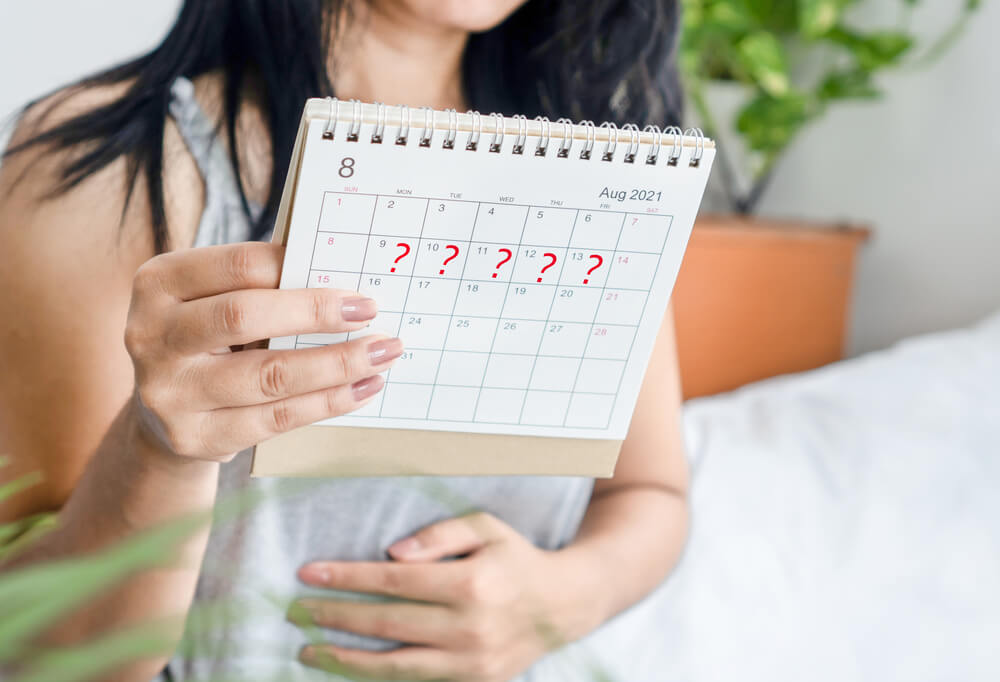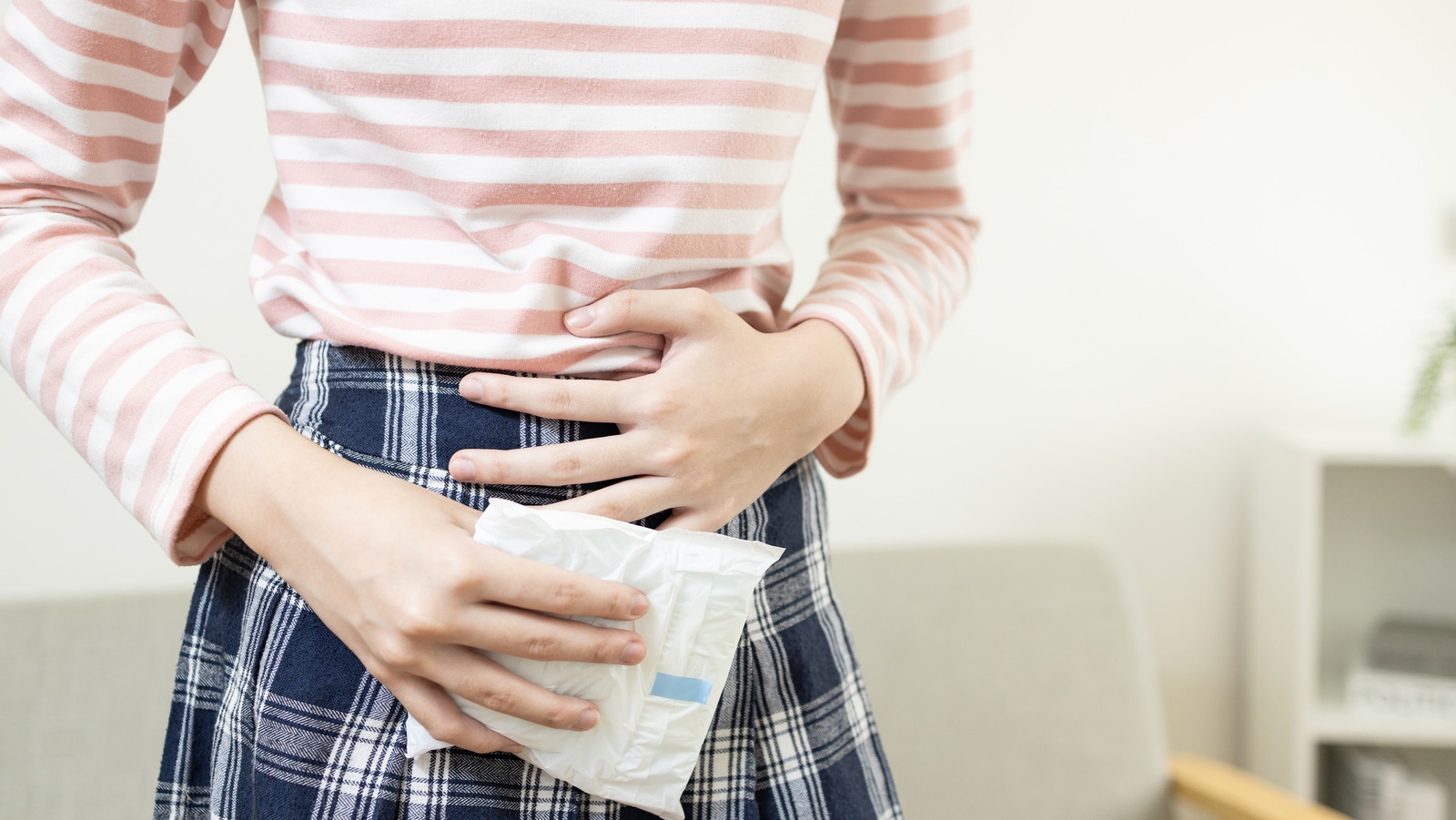It can be surprising and confusing when you get two periods in one month. Normally, you get your period every 28 days or so. But sometimes, your body acts differently. You might bleed at the beginning of the month during your regular time. Then you bleed again later in the same month. There are a few reasons why this can happen. It might be caused by stress, changes in weight, problems with the ovaries or uterus, and more. This blog post talks about the common reasons your body gives you two periods in one month instead of just one.

Contents
Two Periods in One Month: What Does It Mean?
Simply put, having two periods in one month means a woman experiences uterine bleeding associated with menstruation twice during the same calendar month. Some key points:
- A “normal” menstrual cycle spans from the first day of one period to the first day of the next one. For most women, this is every 21-35 days.
- When a woman has two bleeding episodes separated by less than 21 days, it results in two periods within the same month.
- This causes the menstrual cycles to be closer together than is considered average or typical.
- It indicates that ovulation may not be happening or there is abnormal build-up and shedding of the uterine lining between cycles.
Two periods in a month signal irregularity with a woman’s menstrual cycle and fertility patterns. It requires the menstrual cycle to be shorter than normal to have bouts of bleeding occur twice within the same 30-35 day time frame. The causes behind it may vary. However the shortened interval itself can indicate hormonal fluctuations or disruption of normal cyclic activity.
What Causes Two Periods In One Month?
Having two periods in one month can be caused by a variety of factors, ranging from natural variations in your menstrual cycle to underlying health conditions. Here’s a closer look at some of the common causes:

1. Natural Variations in the Menstrual Cycle
Some women naturally have shorter menstrual cycles, which might lead to experiencing a period at the beginning and another towards the end of the same month. This is particularly common in younger women, whose cycles might not yet be regular, and in women approaching menopause, due to hormonal fluctuations.
2. Stress
Stress can impact the hormones that regulate your menstrual cycle, potentially causing it to shorten or lengthen. This hormonal imbalance can result in having two periods in one month or experiencing irregular bleeding.
3. Contraceptive Use
- Starting or Stopping Birth Control: Hormonal birth control methods can affect your menstrual cycle. Adjusting to a new contraceptive or stopping the use of one can lead to irregular bleeding.
- Intrauterine Devices (IUDs): Some women with IUDs, especially those with a non-hormonal IUD, may experience irregular periods or spotting.
4. Thyroid Issues
Both hypothyroidism (an underactive thyroid) and hyperthyroidism (an overactive thyroid) can cause menstrual irregularities, including the possibility of having two periods in one month.
5. Polycystic Ovary Syndrome (PCOS)
PCOS is associated with hormonal imbalances that can disrupt the menstrual cycle, leading to irregular periods, which may sometimes appear as having more than one period in a month.
6. Uterine Abnormalities
Conditions such as uterine fibroids, polyps, or adenomyosis can lead to abnormal uterine bleeding, which might be mistaken for having multiple periods in a month.
7. Weight Fluctuations
Significant weight gain or loss can affect your hormones, potentially leading to changes in your menstrual cycle, including the frequency of periods.
8. Ovulation Bleeding
Some women experience mid-cycle or ovulation bleeding, which can be mistaken for a period. This usually occurs around two weeks before the expected period.
9. Pelvic Inflammatory Disease (PID)
PID is an infection of the female reproductive organs that can cause irregular menstrual bleeding.
Possible Complications
Frequent menstruation, beyond its immediate impact on daily life and comfort, can lead to several potential complications if not addressed. Here are some of the possible complications associated with frequent menstruation:
1. Anemia
Regular, heavy periods can cause a significant loss of blood, leading to iron-deficiency anemia. Symptoms of anemia include fatigue, weakness, pale skin, shortness of breath, and dizziness. Anemia can affect your overall quality of life, physical performance, and cognitive function.
2. Hormonal Imbalance
Frequent menstruation can be both a symptom and a cause of hormonal imbalances. These imbalances can disrupt normal bodily functions, leading to symptoms like weight gain, mood swings, acne, and fertility issues.
3. Impact on Fertility
Underlying conditions causing frequent menstruation, such as PCOS or thyroid disorders, can affect fertility. Irregular ovulation can make it difficult to conceive, requiring specialized treatment or interventions.
4. Mental Health Effects
Dealing with frequent, unpredictable periods can take a toll on mental health. The stress and discomfort can lead to anxiety, depression, and decreased self-esteem, particularly if the condition interferes with daily activities or social interactions.
5. Risk of Endometrial Hyperplasia and Cancer
Conditions associated with frequent and heavy menstruation, such as obesity, PCOS, and unopposed estrogen therapy, can increase the risk of endometrial hyperplasia, where the lining of the uterus becomes too thick. This condition can lead to uterine (endometrial) cancer if left untreated.
6. Quality of Life
Frequent periods can significantly impact quality of life. The discomfort, pain, and unpredictability can affect personal and professional life, social activities, and sexual health.
7. Complications from Underlying Conditions
The conditions that cause frequent menstruation, like fibroids or adenomyosis, can themselves lead to complications, including severe pain, fertility issues, and, in rare cases, the need for surgical intervention.
Is it Normal to Get Your Period Twice a Month?
No, it is generally not normal to get your period twice in one month.

Getting two periods in one month, called abnormal uterine bleeding, usually indicates some kind of hormonal imbalance or disruption of normal menstrual cycles.
Some key points:
- The average menstrual cycle length is between 21 to 35 days. Getting your period twice in one cycle shorter than 21 days is not normal.
- Occasional irregularities happen, but frequent or consecutive incidents of getting two periods in one month usually signify an underlying hormonal, gynecological, or medical condition.
- Potential causes include thyroid disorders, uterine fibroids, pelvic inflammatory disease, adenomyosis, miscarriage, and some cancers or medications.
- Age factors like puberty or perimenopause can also contribute to abnormal bleeding patterns.
While sporadic cycle irregularity happens, repeat incidents of two periods in one-month warrant medical evaluation. Tracking details like cycle length and symptoms helps diagnose causes for double periods in a month. Consulting a doctor helps determine appropriate treatment when normal cycles are disrupted long term.
So How Can You Deal With Two Periods A Month?
Dealing with two periods a month can be frustrating and inconvenient, but there are several approaches you can take, depending on the cause and your specific situation. Here are some options to consider:

1. Understand the Cause:
- Track your cycles: Use a period tracker app or calendar to monitor your cycle length, flow, and symptoms for at least 3 months. This information will help you and your doctor identify any patterns or irregularities.
- Consult a doctor: They can assess your individual situation through a pelvic exam, blood tests, and other investigations to determine the underlying cause, such as hormonal imbalances, uterine fibroids, endometriosis, or stress.
2. Treatment Options:
- Hormonal birth control: If hormonal imbalances are the culprit, your doctor might recommend birth control pills, patches, or injections to regulate your cycle and reduce bleeding.
- Minimally invasive procedures: For issues like fibroids or polyps, procedures like endometrial ablation or myomectomy might be considered to remove or shrink the growths.
- Lifestyle changes: Managing stress, maintaining a healthy weight, and exercising regularly can sometimes help regulate your cycle and potentially reduce heavy bleeding.
3. Managing Symptoms:
- Over-the-counter medications: Pain relievers like ibuprofen or acetaminophen can help manage cramps and discomfort.
- Heating pads and baths: Applying heat to your lower abdomen can relax muscles and ease cramps.
- Menstrual products: Choose absorbent pads, tampons, or menstrual cups that suit your flow and comfort level.
Frequently Asked Questions
Why did I get my period twice in one month?
Getting two periods in a month can be caused by factors like hormone changes during perimenopause, pregnancy, puberty, structural problems, or thyroid disorders affecting your menstrual cycle.
Can stress cause periods twice a month?
High stress levels can lead to more frequent periods or missed ones. Stress triggers hormones in the brain that can disrupt your menstrual cycle, causing irregularities like having periods twice a month.
When should I be worried about breakthrough bleeding?
Seek medical advice if breakthrough bleeding is heavy or lasts over seven days. It could indicate an infection or other issues, prompting a need for alternative contraception methods.
I am a medical student with experience and interest in Women’s health and well-being.